September 28 is International Day for the Right to Voluntary Termination of Pregnancy (Abortion). More than 9 million abortions take place each year on the African continent, three-quarters of which take place in unsafe conditions. Legislation varies depending on the country, but despite signs of relaxation in recent decades, it remains rather restrictive.
In Tunisia, a pioneering African country in this area, 2023 marks the 50th anniversary of the legalization of abortion. But between drug shortages, social conservatism even in the medical profession, and regional inequalities, the reality on the ground does not encourage satisfaction.
Four other countries provide access without restrictions: South Africa, Mozambique, Cape Verde and Benin, where the Council of Ministers adopted in April the decree implementing the law passed in October 2021. According to the American organization Center for Reproductive Rights, the trend is rather towards a relaxation of legislation.
Abortion is possible for medical reasons in around twenty countries on the continent. Half of them, like Algeria, Chad or the DRC, include mental health among these reasons. Zambia, Rwanda or Ethiopia even add socio-economic reasons…
Among the restrictive states, some like Nigeria only allow abortion in cases of risk of death of the mother, or exceptionally after rape or incest, as in Ivory Coast, Mali or Gabon. However, significant challenges remain, such as access to care or social and family ostracization.
The World Health Organization points out that the ban does not reduce the number of abortions, but encourages them to be carried out in dangerous conditions. The Center for Reproductive Rights, for example, estimates that there are 75,000 abortions in Madagascar each year.
Despite this, a handful of countries still prohibit it, whatever the circumstances: Senegal, Mauritania, Egypt, Madagascar or Congo-Brazzaville.
Read alsoAbortion rights: the European Union powerless in the face of attempts to roll back the clock
In Congo-Brazzaville, clandestine abortions… and dangerous
What do women who want to have an abortion do? Our correspondent in Brazzaville, Loicia Martial, went to Avenue des Trois-Martyrs in the fourth arrondissement of the city, in front of the headquarters of the Congolese Association for Family Welfare (ACBEF), where traffic is intense. Sitting in her office, in front of a register registering women who come for consultations, Aurore Makanga, a 34-year-old midwife working in the ACBEF clinic, takes stock of the state of abortion in the country.
“ We can say that in Congo, the majority of abortions are clandestine. For eleven years I have been in the businessI never learned that these abortions were officially advocated in the centers “, she says.
Young girls who wish to continue their studies, or other older women who do not want to give birth or space their births, resort to abortion using unorthodox means.
“ Even in the markets, abortions are practiced, among the gentlemen and women who sell the medicines. “, said Aurore Makanga, chagrined. She is referring to medicines sold on the street, outside pharmacies, which are very dangerous. She points out the risks faced by women who have abortions in poor conditions.
“ There is a risk of sterility if the abortion is performed very poorly. We can also talk about sepsis and tuber obstruction. These are risks that lead to secondary infertility “, she explains.
As abortion is clandestine in Congo, the country does not have official statistics. And convictions are almost non-existent.
In Ivory Coast, abortion authorized but subject to conditions
Despite everything, this practice remains very common: many women opt for clandestine abortions, risking their health. Several organizations are calling for an expansion of the conditions of access to medical abortion, reports our correspondent in Abidjan, Bineta Diagne.
Medical abortion is restricted by law to cases of rape or pregnancies likely to harm the health of the mother. These situations are subject to the opinion of two doctors.
According to the penal code, a woman who attempts to have an abortion outside of these two conditions risks between six months and two years in prison. The person(s) who perform this operation, outside of a health facility, risk between 10 and 20 years in prison in the event of the patient’s death.
There would be ” nearly 280,000 clandestine abortions each year », Indicates a civil society actor. These abortions are carried out in precarious hygienic conditions, often by health providers not suited to this type of operation. Some patients even opt for Chinese medicine as an alternative, notes another source.
Result: numerous health complications are detected. “ Nearly 18% of maternal health deaths are linked to unsafe abortion », Notes a doctor.
Several organizations regularly carry out prevention campaigns, targeting young people and traditional authorities, to talk to them about access to family planning. A preliminary draft law on this subject has been submitted to the general secretariat of the government.
